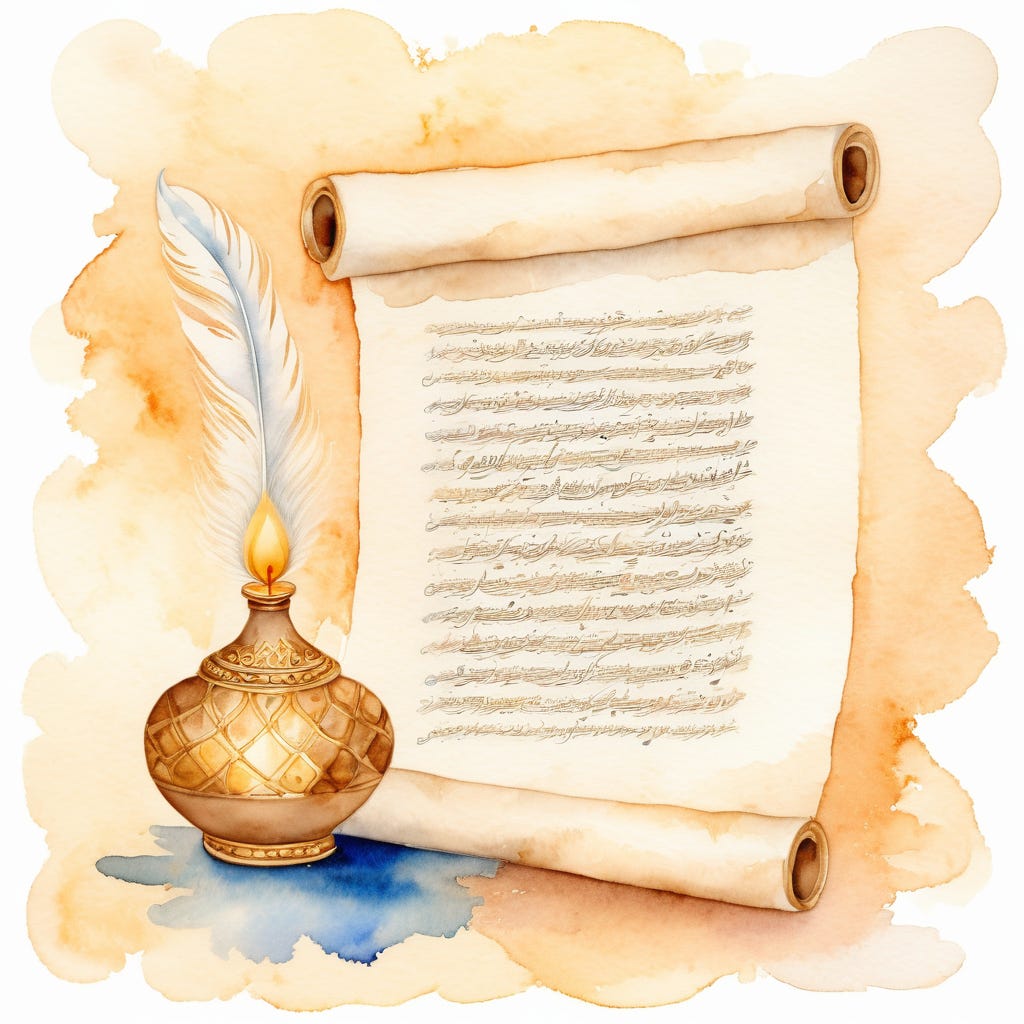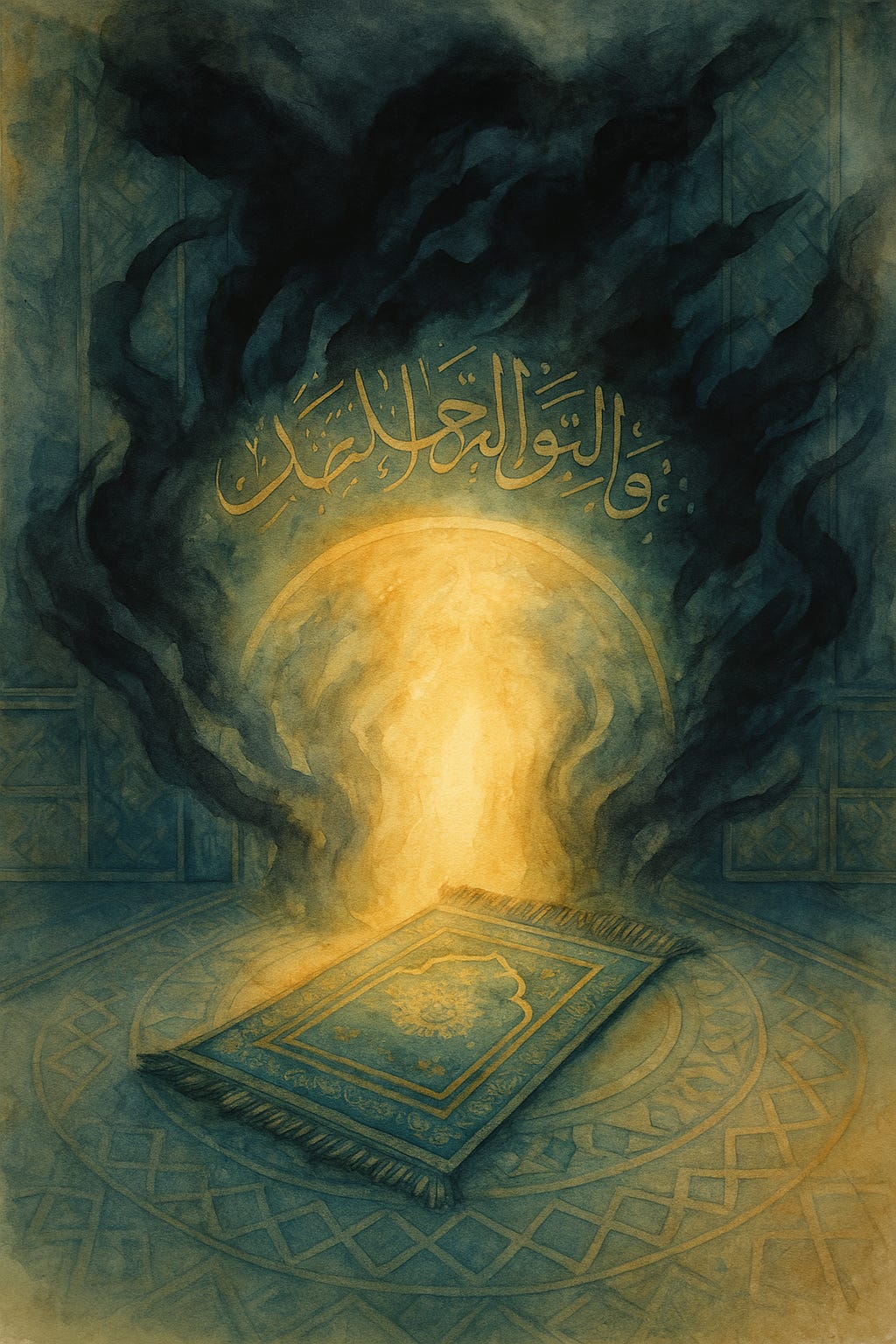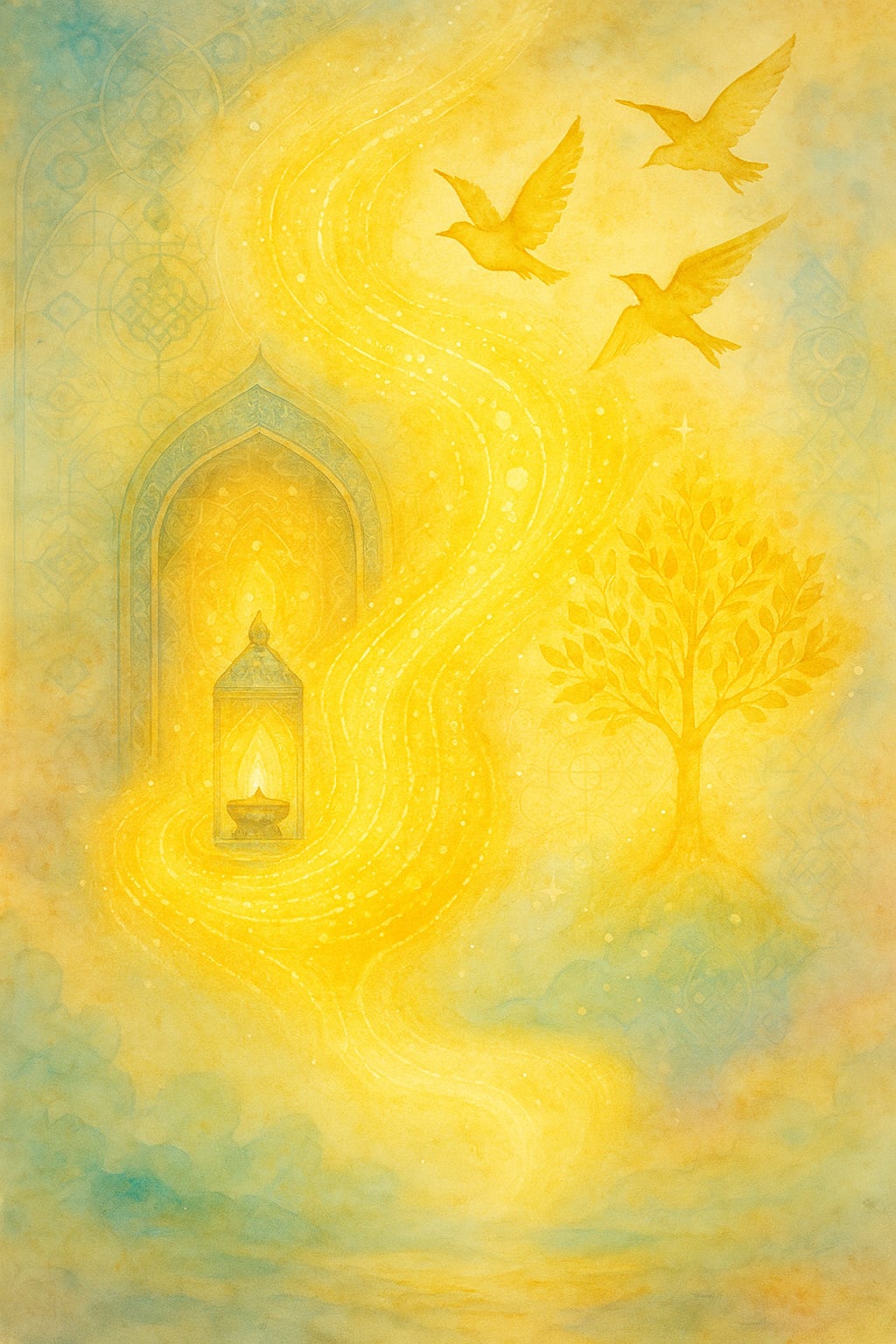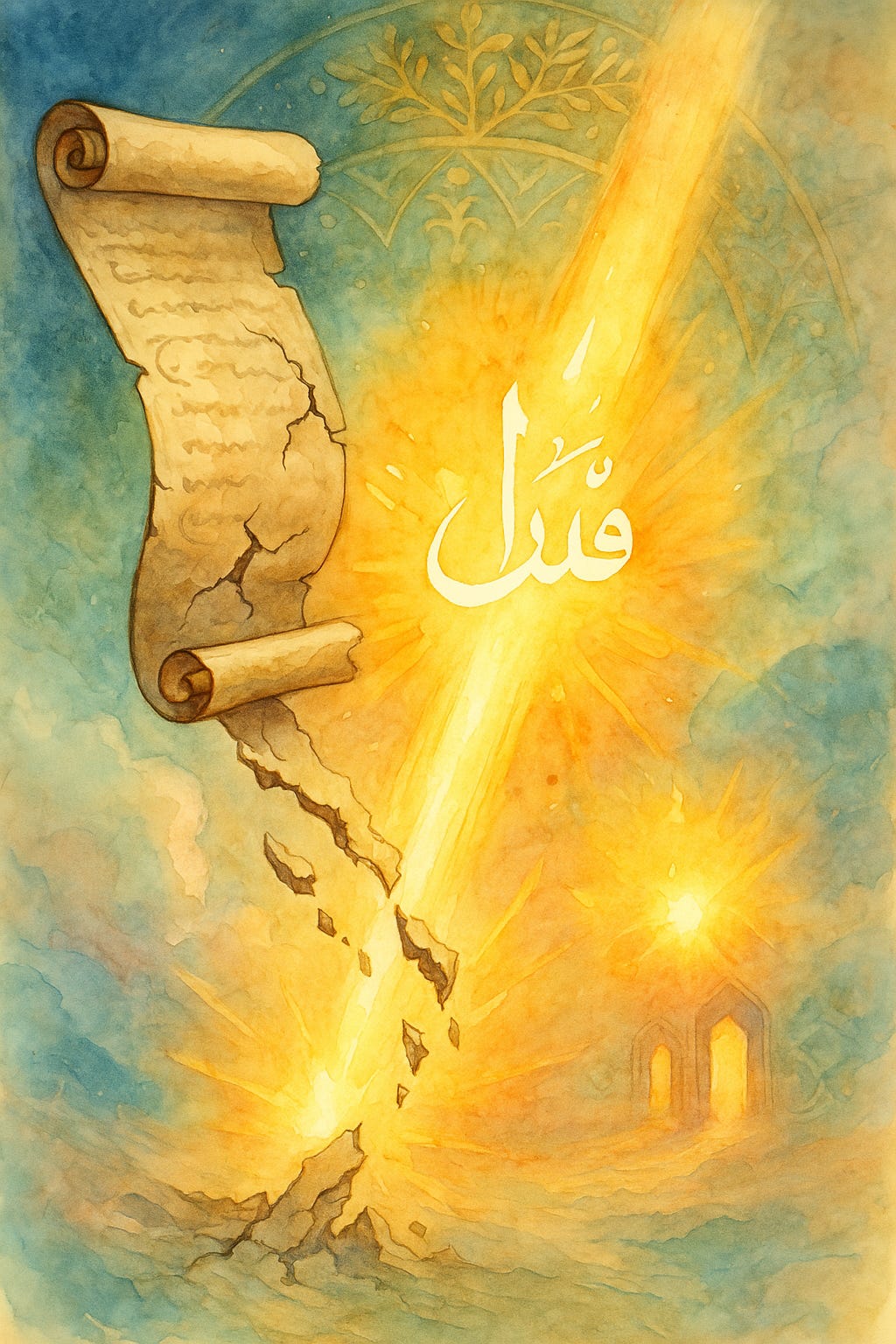[2] The Art of Supplication - Definitions and Merits
A series of discussions based on the book Uddat al-Dai wa Najah as-Saee - The Provision of the Supplicant, and the Triumph of the Seeker by Ibn Fahd al-Hilli on the subject of Supplication and Prayer.
In His Name, the Most High
This is the second part in our series discussing supplications (dua) and the supplicant and the etiquette of supplicating.
As with other series of discussions we have had, it is strongly recommended that the previous parts are read, before continuing with this one, so as to avoid any confusion or misunderstanding within the subject matter.
The nature of the subject matter, and the style of discussion requires that each part build upon the ones that came before, so it is very strongly recommended that the reader, read the previous parts, prior to consuming this one.
The previous parts in this series can be found here:
Video of the Malis (Sermon/Lecture)
This write up is a companion to the video majlis (sermon/lecture) found below:
Recap
In the opening session of this series, we explored the foundations of supplication (dua)—not merely as a ritual act, but as a profound expression of love, longing, and intimate dialogue with God. Drawing on the classical text Uddat al-Dai wa Najah as-Saee (عُدّةُ الدّاعی و نَجاحُ السّاعی) - The Provision of the Supplicant, and the Triumph of the Seeker by Ibn Fahd al-Ḥillī, we set the stage for a deeper journey into the ethics, etiquette, and inner meaning of prayer.
We reflected on why supplication matters, how it aligns us with divine mercy, and how it transforms into a lifelong conversation between the lover and the Beloved. Beyond asking for needs, supplication was shown to be the soul’s yearning for closeness, remembrance (dhikr), and love of God and His chosen ones.
We also introduced the roadmap ahead—covering themes such as the conditions of answered prayers, the states of the supplicant, the etiquette of supplication (dua), the beauty of God’s Names, the role of remembrance (dhikr) and Quranic recitation, and even the etiquette of visiting graves and offering salutations (ziyarah) to the awliya’ and martyrs.
This journey is not just about knowledge, but about transformation—learning to speak to God sincerely, and to love Him in a way that changes how we live. With His help, we now begin the next step of this journey.
Introduction
In this session we will be looking at the definition of what a supplication - dua - is. We will be examining its merits, and trying to understand its importance in the life of a believer.
We will also be looking at many ahadeeth and verse of Quran that define and indeed exhort supplicating (making dua).
we will attempt define these terms, and look at how they are encouraged in both the Quran and ahadeeth. We will examine their merits and their importance as taught by both the Quran and the narrations and traditions of the Prophet Muhammad and his family.
Finally, at the end of these sessions will be a personal supplication scribed by the author, it is somewhat based on other supplications from the Quran, the Prophet and the Ahl al-Bayt (family of the Prophet).
This is to act as an inspiration for the readers, that a person can craft and write their own supplication, and indeed they should, because the art of supplication is an exceptionally intimate congress with a persons most Beloved, and sonnets, ballads and prose are a means of discourse between lovers.
This section will be known as the ‘Whispers Beneath the Throne’ section, and every write-up on this subject from this one forward will have this section at the end of the write-up.
We ask Him to grant us the tawfeeq (ability) and fortitude, presence of mind, heart and soul to continue this endeavour and to move forward, ever closer to Him, such that we may never be deprived of His presence and that we may eternally bask in His immense glory.
In the name of the One Who answers all who call upon Him, we begin with His name …
What Does It Mean to Supplicate?
The Depth and Difficulty of Translating “Dua”
Dua is one of the most important notions within Islamic thought. It is spoken of greatly in the Quran, however the word ‘dua’ is actually quite difficult to translate accurately.
Words that have been used to translate it are words like ‘prayer’, ‘calling’ and as we’ve been using ‘supplicating’. However, these words do not entirely convey the full and profound meaning of this word.
So let us try to understand what this word actually means properly.
“Call Me and I Will Answer”: Understanding God’s Invitation
Firstly, in Quran, the significance of dua is mentioned, in Surah al-Ghafir (the Chapter of the Forgiver):
وَقَالَ رَبُّكُمُ ادْعُونِي أَسْتَجِبْ لَكُمْ ۚ إِنَّ الَّذِينَ يَسْتَكْبِرُونَ عَنْ عِبَادَتِي سَيَدْخُلُونَ جَهَنَّمَ دَاخِرِينَ
Your Lord has said, ‘Call Me, and I will answer you!’ Indeed those who refuse to worship Me, will enter hell in utter humiliation.
- Quran, Surah al-Ghafir (the Chapter of the Forgiver) #40, Verse 60
Over here, God is explicitly saying ‘call me’, as opposed to ‘ask me’, just ‘call me’ - meaning that it is like an open invite to contact God, to call upon God, no matter the situation, no matter the time, no matter the location.
Dua Beyond Requests: The Intimacy of Speaking to God
Generally, people have this understanding that dua is a means to ‘ask’ God for something. When someone has a need for something, say they need a problem to be dispelled, or they want something, then it is generally thought that should said person make a ‘dua’, this is somehow what is meant by making dua.
However, since God in the Quran is saying ‘call me’ - and not ‘ask me’ or any other verb - we can conclude that this means that God wants us to actually ‘call him’, to speak to him, not only when we have a need for something, but in the way you would call a friend just to talk to him or her.
And this notion of ‘calling’ this is a concept that is broad, and includes all different types of calling - from just telling Him about how good your day went, to complaining about something, to just wanting to pour your heart out to someone, to wanting to ask His advice, to wanting to ask for something, perhaps, tangible or perhaps intangible.
For us as servants of God, as creations of God, the most important thing should be that we can communicate with Him, and that we can be connected to Him.
Indeed, we should never forget that we cannot survive or even exist without Him, without having some sort of connection to Him, without being connected to Him.
Consider for a moment, that God, while being there, were to say:
“I don’t want to talk to, or listen to you or have anything to do with you anymore”
As a servant, as a creation, as one entirely dependent upon God, this would be devastating, we cannot survive without Him, without His mercy, without His grace.
A Child and Their Lord: Lessons from Tarbiyyah (Nurturing)
Consider a child - especially one in their early years - if their parent - mother or father - were to say to him or her:
“I won’t speak to you anymore”
That would be truly devastating for the child. In the early years of childhood, children have no sense of independence, so for them to experience their parents shunning them in this manner would be a disaster.
Indeed, in the early years of childhood, a child is truly impressionable and as mentioned without independence, this is why we are taught in the subject of raising children (tarbiyat al-awlaad - تربية الأولاد), that one should never break a promise to your child.
If you have promised your child that as you return from work, you will bring them a sweet, and then because you became busy, you forget - before you goto the child - go to a shop and buy the sweet - because the child looks up at you as their ‘lord’, as the one who gives them sustenance and who guides them.
Therefore disappointing a child can be tragic, as you are their only hope at that time.
Indeed there is a hadeeth from Prophet Muhammad regarding this:
عن أبي عبدالله ع قال: قال رسول الله صلى الله عليه وآله: أحبوا الصبيان وارحموهم وإذا وعدتموهم شيئا ففوا لهم فإنهم لا يدرون إلا أنكم ترزقونهم
From Abu Abdullah (Imam Ja’far as-Sadiq) (peace be upon him), who said:
The Messenger of Allah (peace and blessings be upon him and his family) said:
“Love the children and be merciful to them. And when you promise them something, fulfil it — for they know nothing except that you are the ones who provide for them.”
- Al-Kulayni, Muhammad ibn Ya‘qub. Al-Kafi vol. 6, p. 49, Book of Aqiqah, Chapter: “Kindness to Children,” Hadeeth No. 114502.
The True Punishment: Being Distant from God
Indeed, in the same way that such a statement from its parents would be akin to a horrific punishment, it would be also the most terrible punishment for any human if God refused to pay them any attention.
In the Supplication of Kumayl (Dua Kumayl), Imam Ali, says:
وَهَبْنِي صَبَرْتُ عَلَى حَرِّ نَارِكَ
فَكَيْفَ أَصْبِرُ عَنِ النَّظَرِ إِلَى كَرَامَتِكَAnd suppose that I am able to endure the heat of Your fire,
How can I endure not gazing upon Your generosity?- Dua Kumayl
Over here we can see that the Imam is saying:
“Suppose I can be patient, that I can tolerate Your punishment, how can I be patient while being deprived of Your grace and magnanimity?!”
If, I can supposedly, endure your punishment in Hell, how can I tolerate being far from You, from Your love and attention?
For the person who understands that he is totally dependent on God, the main thing is to keep the line of communication with Him always open.
God’s Accessibility, Our Excuses
This leads us back to the verse of Quran, where God says:
ادْعُونِي أَسْتَجِبْ لَكُمْ ۚ
“Call Me, and I will answer you!”
This means, that God is saying to us over here:
“You can call Me, anytime, day or night, weekdays or weekends, anytime you can call Me and I will be available”
Of course, since He is our Lord, our Master, our Sustainer, our God, he could have set conditions down for when, how and where we can call upon Him, He could have said:
“If you want to call Me, you must do so at such and such time or place, and with such and such conditions!”
Yet look at His kindness, look at how unconditionally He loves, that He has said very clearly:
“Call me no matter, when or where, I will answer you, I will be available for you!”
Having said that, it is also understood that He also expects us to answer Him whenever He calls us, that His love for us is not unrequited, but that rather it is reciprocal and reciprocated.
Unfortunately, however, we set different conditions for our responding to God’s call. Many a time we say:
“I will become ‘a practicing Muslim’ after I finish university or college, or after I get married, or after I have children, or after I have a good job. For now let me ‘enjoy myself a little’ and then later once I’m old, I will accept and become ‘practicing’”
However, we should remember, that God, after inviting us to call Him, continues in the verse saying:
إِنَّ الَّذِينَ يَسْتَكْبِرُونَ عَنْ عِبَادَتِي سَيَدْخُلُونَ جَهَنَّمَ دَاخِرِينَ
Indeed those who refuse to worship Me, will enter hell in utter humiliation.
Dua as Worship: Love in the Language of Supplication
Now, over here, the word used in the second portion is Ibadah, which is commonly translated as worship.
However, we have previously discussed in our series on the Lantern of the Path, that worshiping God is to love God.
Further more, we have from the traditions of the Prophet and his family that:
أَبُو عَلِيٍّ الْأَشْعَرِيُّ، عَنْ مُحَمَّدِ بْنِ عَبْدِ الْجَبَّارِ، عَنْ صَفْوَانَ، عَنْ عَلِيِّ بْنِ إِسْمَاعِيلَ، عَنْ مُحَمَّدِ بْنِ عَمْرِو بْنِ حَزْمٍ، عَنْ أَبِي عَبْدِ اللَّهِ (عَلَيْهِ السَّلَامُ) قَالَ: قَالَ رَسُولُ اللَّهِ (صَلَّى اللهُ عَلَيْهِ وَآلِهِ):
إِنَّ الدُّعَاءَ هُوَ الْعِبَادَةُAbu Ali al-Ash’ari, from Muhammad ibn Abd al-Jabbar, from Safwan, from Ali ibn Ismail, from Muhammad ibn Amro ibn Hazm, from Abu Abdillah (Imam Ja’far as-Sadiq) (Peace be upon him), who said:
‘The Messenger of Allah (peace and blessings be upon him and his family) said:
“Indeed, supplication (dua) is worship.”’
- Al-Kulayni, Muhammad ibn Yaqub. Al-Kafi vol. 2, p. 467, Book of Supplication (Kitab al-Dua), Chapter: “Merit of Supplication”, Hadeeth No. 2.
And another tradition which says:
قال رسول الله (صلى الله عليه وآله)
“الدعاء مخ العبادة، ولا يهلك مع الدعاء أحد”The Messenger of God (peace and blessings be upon him and his family) said:
“Supplication (dua) is the essence of worship, and no one perishes with supplication (dua).”
- Al-Amili, al-Hurr ibn al-Hasan. Wasail al-Shia, vol. 7, p. 28, Book of Prayer, Chapter: “Merit of Supplication,” Hadeeth No. 7158.
The Essence and Core of Worship
These tell us that dua or supplication are both:
Worship (ibadah) - essentially an expression of love for God
The Core of Worship (ibadah) - supplication is at the very core of worshipping God, indeed of loving God.
Once we understand that dua is such a core component of worshipping or loving God, we can see that loving God or worshipping God, without dua, without supplication is impossible.
And indeed, the verse of Quran from Surah al-Ghafir, tells us clearly the fate of those who refuse to worship God due to their arrogance - as in thinking it is something that is ‘beneath them’ or ‘not useful’ and such:
سَيَدْخُلُونَ جَهَنَّمَ دَاخِرِينَ
(They) will enter hell in utter humiliation.
Hidden Realities and the Hereafter
The arrogance they exhibit in this world, in this realm, manifests itself as their abject humiliation in the next day, in the afterlife.
Indeed, this is a very succinct point, because one of the things we know about the Hereafter, is that it is a place where hidden realities are made manifest, when the veils are removed and reality can be seen as it actually is.
Furthermore, the reality of arrogance in the face of God, is nothing but malice and complete dishonour.
This verse, therefore, shows us the significance and importance of supplication, of dua. Indeed, the supplication of those who truly call God, who truly reach out to Him, is never left unanswered.
The Response May Not Look Like an Answer
However, it is important to note that sometimes that answer might not be the one that is expected, and we will cover this in future sessions in this series.
More so, since we know that the supplication of the ones who truly call out to God are always answered, then we too, should be cautious and not feel arrogant with regard to calling upon God, we should not think that it is something beneath us, or that its not necessary or that ‘it takes too long’ and such, because that will certainly lead to our complete dishonour and make us be from the losers in the Hereafter, thereby depriving ourselves of eternal bliss.
Elsewhere in Quran, we find God says:
قُلْ مَا يَعْبَأُ بِكُمْ رَبِّي لَوْلَا دُعَاؤُكُمْ ۖ فَقَدْ كَذَّبْتُمْ فَسَوْفَ يَكُونُ لِزَامًا
Say: ‘My Lord cares little for you if it was not for your dua (supplication), but you have denied (the truth), so the punishment will be inevitable’
- Quran, Surah al-Furqan (the Chapter of the Criterion) #25, Verse 77
Over here God is clearly saying, that had it not been for our dua, God would not pay attention to us.
Indeed, that God is so kind and merciful, but this is a universal law, which none can change.
Two plus two will always equal four; in the same way it is impossible to ask God to make it so that it becomes equal to five by virtue of His mercy!
It is impossible to grow as a believer, to grow spiritually, without dua.
Now, it is known that God pays attention to all in this world, both humans and non-humans, regarding their physical needs and requirements, everything is - as is well known - under His purview.
However, if one desires or seeks the attention, support, care and guidance of God for his or her spiritual growth, and to become ever closer to Him, then there is no way to do this without dua, without calling unto Him.
We have many ahadeeth about dua, its conditions and etiquettes, and we will of course be discussing them as we progress in this series, there are special supplication for specific days and times, and for specific needs and such; these are in many of the books of dua - such as Sahifa as-Sajjadiyyah - which is one of the resources that we will be studying as we progress through this series of sessions and develop our understanding of this subject, God willing.
More so, we should never think that supplicating to God is without value, or that it cannot change a thing that has already been decided so to speak; and this is explained very clearly by Imam as-Sadiq, the sixth Imam of the Muslims, in his discussion to his companion Muyassar, the following:
قَالَ أَبُو عَبْدِ اللَّهِ (عَلَيْهِ السَّلَامُ) لِمُيَسَّرٍ: يَا مُيَسَّرُ! ادْعُ وَ لَا تَقُلْ قَدْ فُرِغَ مِنَ الْأَمْرِ، فَإِنَّ عِنْدَ اللَّهِ عَزَّ وَ جَلَّ مَنْزِلَةً لَا تُنَالُ إِلَّا بِمَسْأَلَةٍ، وَ لَوْ أَنَّ عَبْداً سَدَّ فَاهُ وَ لَمْ يَسْأَلْ لَمْ يُعْطَ شَيْئاً، فَسَلْ تُعْطَ، يَا مُيَسَّرُ! مَا مِنْ بَابٍ يُقْرَعُ إِلَّا يُوشَكُ أَنْ يُفْتَحَ لِصَاحِبِهِ.
Imam al-Sadiq (peace be upon him) said to Muyassar: “O Muyassar! Pray to God, and do not say that the matter is already decided. Verily, there is a station with God Almighty that cannot be reached except by asking. If a servant shuts his mouth and does not ask, he will not be given anything. Ask so that you will be given. O Muyassar! There is no door that is knocked on except that its owner will likely open it.”
- Al-Kulayni, Muhammad ibn Yaqub. Al-Kafi, vol. 2, p. 466–467, Book of Supplication (Kitab al-Dua), Chapter: “The Merit of Supplication,” Hadeeth No. 3
We should never think that it is too late to ask God, that He has already decided things and that nothing can be changed. This is one way that we can be arrogant - to think that God will not listen, even when He has clearly said that He wants us to call out to Him.
We must always take the opportunity to pray, to supplication, to make dua, even when we have nothing we wish to ask for, we should still call to Him.
There is - as mentioned in the hadeeth above - a station with God, a proximity with God that can only be reached by supplicating to Him, by calling Him, by making dua.
Indeed, even if when a supplicant asks for something - and we will cover this in more detail in a future session - and it is not given to him for some reason, that which the supplicant achieves through the act of asking, of calling to God, is for more important.
Asking is not merely a means of achieving or obtaining things; rather, it is an end in an of itself.
The Weapon of the Believer
There is another very interesting hadeeth in the same section of al-Kafi which reads:
حَدَّثَنَا عَلِيُّ بْنُ إِبْرَاهِيمَ، عَنْ أَبِيهِ، عَنْ عَبْدِ اللَّهِ بْنِ مَحْبُوبٍ، عَنْ مُحَمَّدِ بْنِ فُضَيْلٍ، عَنْ أَبِي حَمْزَةَ، عَنْ أَبِي عَبْدِ اللَّهِ (عَلَيْهِ السَّلَامُ) قَالَ: قَالَ رَسُولُ اللَّهِ (صَلَّى اللهُ عَلَيْهِ وَآلِهِ)
الدُّعَاءُ سِلَاحُ الْمُؤْمِنِ، وَعِمَادُ الدِّينِ، وَنُورُ السَّمَاوَاتِ وَالْأَرْضِNarrated from Abu Abdullah (Imam Jaʿfar al-Sadiq, peace be upon him), who said: The Messenger of Allah (peace and blessings be upon him and his family) said: “Supplication (dua) is the weapon of the believer, the pillar of religion, and the light of the heavens and the earth.”
- Al-Kulayni, Muḥammad ibn Yaqub. Al-Kafi, vol. 2, p. 468, Book of Supplication (Kitab al-Duaʾ), Chapter: “Pleading Before Allah for Help Is a Believing Person’s Weapon,” Hadeeth No. 2
And what is interesting is that there is an entire chapter in the book of al-Kafi, in the Book of Supplication, that is specifically titled:
“Pleading Before Allah for Help Is a Believing Person’s Weapon”
or we could simplify the title as:
“Dua is a Believer’s Weapon”
There is a another very beautiful hadeeth, from Prophet Muhammad and narrated by Imam as-Sadiq, and it can be found in Bihar al-Anwar which reads:
قَالَ رَسُولُ اللَّهِ (صَلَّى اللَّهُ عَلَيْهِ وَآلِهِ):
“أَلَا أَدُلُّكُمْ عَلَى سِلَاحٍ يُنْجِيكُمْ مِنْ أَعْدَائِكُمْ وَيَدِرُّ أَرْزَاقَكُمْ؟”
قَالُوا: بَلَى. قَالَ
“تَدْعُونَ رَبَّكُمْ بِاللَّيْلِ وَالنَّهَارِ، فَإِنَّ دُعَاءَ الْمُؤْمِنِ سِلَاحُهُ”The Messenger of God (peace and blessings be upon him and his family) said: “Shall I guide you to a weapon that will save you from your enemies and increase your sustenance?” They replied: “Indeed, O Messenger of God.” He said: “Call upon your Lord day and night, for the supplication of the believer is his weapon.”
- Al-Majlisi, Muḥammad Baqir. Bihar al-Anwar, vol. 76, p. 294
Why Do We Need a Weapon?
But now a question comes to mind:
Why would the believer need a weapon?
The answer is simple, especially to one who understands the influences that prey upon the human.
We are all involved in a constant battle; this is sometimes referred to as the Greater Struggle (Jihad); this is a battle with the external Satans and tawagheet, as well as with our own selves, our own carnal selves (النَّفْسُ الأَمَّارَةُ بِالسُّوءِ - The soul that commands (or incites) to evil).
Indeed the carnal self is in fact the most dangerous and worst of enemies; as was mentioned by Prophet Joseph (Yusuf) and is recounted in the Quran:
وَمَا أُبَرِّئُ نَفْسِي ۚ إِنَّ النَّفْسَ لَأَمَّارَةٌ بِالسُّوءِ إِلَّا مَا رَحِمَ رَبِّي ۚ إِنَّ رَبِّي غَفُورٌ رَّحِيمٌ
And I do not absolve my own self. Indeed, the soul is ever-inclined to evil, except those upon whom my Lord has mercy. Indeed, my Lord is Forgiving, Merciful.
- Quran, Surah Yusuf (the Chapter of Joseph) #12, Verse 53
The weapon or protection we might say - but isn’t a weapon a type of protection in and of itself? - is to beg God for His mercy; and one of the most potent ways that this can be done, is by way of dua, by way of supplication.
The Battle Within: Our Most Dangerous Enemy
Indeed, the carnal soul (or self) is our most hostile enemy, as mentioned by Imam Ali, the first Imam of the Muslims:
نَفْسُكَ عَدُوٌّ مُحارِبٌ، وضِدٌّ مُواثِبٌ، إنْ غَفَلْتَ عَنْها قَتَلَتْكَ
“Your [carnal] soul is a hostile enemy and an aggressive adversary; if you are unmindful of it, it will kill you.”
- Al-Amidī, Abu al-Fath. Ghurar al-Ḥikam wa Durar al-Kalim, Hadeeth No. 10572, Chapter: “The Soul and Holding It to Account.”
What is the reason for the immense danger of the carnal self? Because without the help of our carnal selves, our carnal souls, Satan cannot do anything.
Satan can suggest certain - and in fact that is all he does, he suggests - but it us, succumbing to our carnal selves that perform the sin or negative action.
This is clearly articulated in the Quran:
كَمَثَلِ الشَّيْطَانِ إِذْ قَالَ لِلْإِنسَانِ اكْفُرْ فَلَمَّا كَفَرَ قَالَ إِنِّي بَرِيءٌ مِّنكَ إِنِّي أَخَافُ اللَّهَ رَبَّ الْعَالَمِينَ
“[Their] example is like that of Satan when he says to man, ‘Disbelieve,’ but when he disbelieves, he says, ‘Indeed, I am disassociated from you. Indeed, I fear God, Lord of the worlds.’
- Quran, Surah al-Hashr (the Chapter of the Gathering) #59, Verse 16
Over here we see that Satan only tells a person to commit a crime, or to disbelieve or commit a sin, it is down to the person themselves, as they succumb to the machinations and whims of their base carnal selves, that they go and commit the crime or sin in and of itself.
Supplication: The Light and Lifeline of the Soul
Therefore the fact that dua is the weapon of the believer is a very important point. Furthermore, this is a weapon that is very easy to both obtain and use.
All a believer has to do, is to appreciate that God has given him the ability to supplicate, to do a dua, at any time he so desires.
A believer should always keep his dua fresh, should always be in a state of doing dua - calling to God.
Indeed, our daily prayers, these are a form of dua, and dua is not exclusive to the human being, indeed the Quran tells us that even the birds are doing dua:
أَلَمْ تَرَ أَنَّ اللَّهَ يُسَبِّحُ لَهُ مَن فِي السَّمَاوَاتِ وَالْأَرْضِ وَالطَّيْرُ صَافَّاتٍ ۖ كُلٌّ قَدْ عَلِمَ صَلَاتَهُ وَتَسْبِيحَهُ ۗ وَاللَّهُ عَلِيمٌ بِمَا يَفْعَلُونَ
Have you not regarded that God is glorified by everyone in the heavens and the earth, and the birds spreading their wings. Each knows his prayer and glorification, and God knows best what they do.
- Quran, Surah an-Nur (the Chapter of the Light) #24, Verse 41
Further more, supplicating, making dua is to reflect the Light of God:
اللَّهُ نُورُ السَّمَاوَاتِ وَالْأَرْضِ ۚ مَثَلُ نُورِهِ كَمِشْكَاةٍ فِيهَا مِصْبَاحٌ ۖ الْمِصْبَاحُ فِي زُجَاجَةٍ ۖ الزُّجَاجَةُ كَأَنَّهَا كَوْكَبٌ دُرِّيٌّ يُوقَدُ مِن شَجَرَةٍ مُّبَارَكَةٍ زَيْتُونَةٍ لَّا شَرْقِيَّةٍ وَلَا غَرْبِيَّةٍ يَكَادُ زَيْتُهَا يُضِيءُ وَلَوْ لَمْ تَمْسَسْهُ نَارٌ ۚ نُّورٌ عَلَىٰ نُورٍ ۗ يَهْدِي اللَّهُ لِنُورِهِ مَن يَشَاءُ ۚ وَيَضْرِبُ اللَّهُ الْأَمْثَالَ لِلنَّاسِ ۗ وَاللَّهُ بِكُلِّ شَيْءٍ عَلِيمٌ
God is the Light of the heavens and the earth. The parable of His Light is a niche wherein is a lamp—the lamp is in a glass, the glass as it were a glittering star—lit from a blessed olive tree, neither eastern nor western, whose oil almost lights up, though fire should not touch it. Light upon light. God guides to His Light whomever He wishes. God draws parables for mankind, and God has knowledge of all things.
- Quran, Surah an-Nur (the Chapter of the Light) #25, Verse 35
Keys to Success and Salvation
In another hadeeth, Imam Ali says:
قَالَ أَمِيرُ الْمُؤْمِنِينَ (عَلَيْهِ السَّلَامُ)
“إِنَّ الدُّعَاءَ مَفَاتِيحُ النَّجَاحِ وَمَفَاتِيحُ الْفَلَاحِ، وَخَيْرُ الدُّعَاءِ مَا صَدَرَ عَنْ صَدْرٍ نَقِيٍّ وَقَلْبٍ تَقِيٍّ”The Commander of the Faithful (peace be upon him) said: “Indeed, supplications are the keys to success and the keys to salvation. The best supplication is that which comes from a pure chest and a pious heart.”
- Al-Kulayni, Muḥammad ibn Yaqub. Al-Kafi, vol. 2, p. 468, Book of Supplication (Kitab al-Duaʾ), Chapter: “The Merit of Supplication,” Hadeeth No. 3
The Pure Heart as the Vessel of Dua
Looking at this hadeeth, we can see that dua is not just a key (singular) to success, rather, it provides the keys (plural) to success.
This means that there are more than one keys to success. If a person wishes to be successful, he has to increase and be more fervent in his supplication to God, in his calling God, in his speaking to God.
The best of duas, the best of supplications, is that which comes from a pure and clean heart, because it is through the heart that one connects to God, it is through the heart and indeed the soul, that one falls in love with God.
The mind is for the theoretical understanding.
You might have a person who knows in their mind that God exists, but he is still not a believer. The place of belief and disbelief is in the heart - and the word heart here, is not a reference to the physical heart. To supplicate, to make dua, one must have a pure heart.
What is beautiful, is that one can ask God, supplicate to God, as well as make efforts within themselves, to cleanse their heart, to build their love for Him, and given that He has promised He will answer, this too shall come to pass.
Prophet Muhammad is known to have said:
قَالَ رَسُولُ اللَّهِ (صَلَّى اللَّهُ عَلَيْهِ وَآلِهِ)
“أَلَا أَدُلُّكُمْ عَلَى سِلَاحٍ يُنْجِيكُمْ مِنْ أَعْدَائِكُمْ وَيَدِرُّ أَرْزَاقَكُمْ؟”
قَالُوا: “بَلَى.” قَالَ: “تَدْعُونَ رَبَّكُمْ بِاللَّيْلِ وَالنَّهَارِ، فَإِنَّ الدُّعَاءَ سِلَاحُ الْمُؤْمِنِThe Messenger of God (peace be upon him and his family) said: “Shall I guide you to a weapon that will save you from your enemies and increase your sustenance?” They replied: “Indeed, O Messenger of God.” He said: “Call upon your Lord day and night, for supplication is the weapon of the believer.”
- Al-Kulayni, Muḥammad ibn Yaqub. Al-Kafi vol. 2, p. 468, Book of Supplication (Kitab al-Duaʾ), Chapter: “The Merit of Supplication,” Hadith No. 3.
Indeed, we all need a weapon to protect ourselves, we have no desire to harm another, but we do need to be protected.
Prophet Muhammad teaches us that if we want sustenance, if we seek protection, then we need a weapon. He then teaches, that that weapon is to pray to God, day and night.
Imam ar-Ridha, the eighth Imam of the Muslims, used to say:
قال الإمام الرضا (عليه السلام)
“عليكم بسلاح الأنبياء”. فقيل: “وما سلاح الأنبياء؟” قال: “الدعاء”Imam ar-Ridha (peace be upon him) said: “You should hold on to the weapon of the prophets.” He was asked: “What is the weapon of the prophets?” He replied: “Supplication.”
- Al-Qurashi, Baqir Sharif. The Life of Imam Ali Bin Musa al-Ridha, Chapter 2: His Qualities.
The Power of Dua to Change Destiny
In the book al-Kafi, there is another chapter about the power of dua, of supplication, to change the ‘qada’ (divine decree).
We know that when something is going to happen, certain conditions must already have been met. For example, if we want to heat a room, we should have a heater of some sort, or perhaps we should have fire, dry wood, kindling and oxygen. Otherwise we cannot heat the room, we cannot have a fire.
Sometimes, everything is ready for a disaster to happen, but dua comes in the last moments and prevents that tragedy.
Prophet Jonah and the Power of Collective Supplication
In the beautiful story of Prophet Jonah (Yunus), we read that he left his people, when he was disappointed with them and saw the signs of an impending divine punishment:
وَذَا النُّونِ إِذ ذَّهَبَ مُغَاضِبًا فَظَنَّ أَن لَّن نَّقْدِرَ عَلَيْهِ فَنَادَىٰ فِي الظُّلُمَاتِ أَن لَّا إِلَٰهَ إِلَّا أَنتَ سُبْحَانَكَ إِنِّي كُنتُ مِنَ الظَّالِمِينَ
And [remember] the Man of the Fish (Jonah/Yunus), when he left in a rage, thinking that We would not put him to hardship. Then he cried out in the darkness, ‘There is no god except You! You are immaculate! I have indeed been among the wrongdoers!’
- Quran, Surah al-Anbiya (the Chapter of the Prophets) #21, Verse 87
The divine punishment was coming, and he saw its signs and so he left the people. When he left, one learned person from those people said:
“I am sure that the chastisement is coming. We have only one way to save ourselves, and that is by supplicating (making dua), and asking God for forgiveness.”
The people listened to him, and therefore, the divine punishment was prevented. The Quran also speaks of this:
فَلَوْلَا كَانَتْ قَرْيَةٌ آمَنَتْ فَنَفَعَهَا إِيمَانُهَا إِلَّا قَوْمَ يُونُسَ لَمَّا آمَنُوا كَشَفْنَا عَنْهُمْ عَذَابَ الْخِزْيِ فِي الْحَيَاةِ الدُّنْيَا وَمَتَّعْنَاهُمْ إِلَىٰ حِينٍ
Why has there not been any town that might believe, so that its belief might benefit it, except the people of Jonah (Yunus)? When they believed, We removed from them the punishment of disgrace in the life of this world, and We provided for them for a while.
- Quran, Surah Yunus (the Chapter of Jonah) #10, Verse 98
Even though the punishment was about to take place, and its signs had begun appearing, they were saved from it because of their sincere supplications (duas) to God.
Do dua - supplication - is very powerful, it is so effective, that according to some narrations (ahadeeth), it can change what is decided on the Night of Power/Decree (Laylat al-Qadr - لَيْلَةُ الْقَدْرِ).
Therefore, one should never lose hope, it is never too late to supplicate, to make dua, to call upon God, He, who listens to all who call Him.
Even the Decreed Can Be Repelled
There are multiple ahadeeth (narrations) that teach that dua - supplication - prevents a calamity, even after it is firmly determined:
This one from Imam as-Sadiq:
قَالَ أَبُو عَبْدِ اللَّهِ (عَلَيْهِ السَّلَامُ)
«إِنَّ الدُّعَاءَ يَرُدُّ الْقَضَاءَ بَعْدَ مَا أُبْرِمَ إِبْرَامًا فَأَكْثِرْ مِنَ الدُّعَاءِ فَإِنَّهُ مِفْتَاحُ كُلِّ رَحْمَةٍ وَنَجَاحُ كُلِّ حَاجَةٍ، وَلَا يُنَالُ مَا عِنْدَ اللَّهِ إِلَّا بِالدُّعَاءِ، وَإِنَّهُ لَيْسَ بَابٌ يُكْثِرُ الْعَبْدُ الْقَرَعَ إِلَّا يُوشِكُ أَنْ يُفْتَحَ لَهُ»Aba Abdillah (peace be upon him) said: “Indeed, supplication repels the divine decree after it has been firmly determined. So, increase your supplications, for it is the key to every mercy and the fulfilment of every need. What is with Allah cannot be attained except through supplication, and there is no door that a servant persistently knocks upon except that it will soon be opened for him.”
- Al-Kulayni, Muḥammad ibn Yaqub. Al-Kafi, vol. 2, p. 469, Book of Supplication (Kitab al-Dua), Chapter: “The Merit of Supplication,” Hadeeth No. 5
And this one from Imam as-Sajjad:
قَالَ عَلِيُّ بْنُ الْحُسَيْنِ (عَلَيْهِ السَّلَامُ)
«إِنَّ الدُّعَاءَ يَدْفَعُ مَا نَزَلَ وَمَا لَمْ يَنْزِلْ»Ali ibn al-Husayn (peace be upon him) said: “Indeed, supplication repels what has descended and what has not yet descended.”
- Al-Kulayni, Muḥammad ibn Yaqub. Al-Kafi vol. 2, p. 470, Book of Supplication (Kitab al-Dua), Chapter: “The Merit of Supplication,” Hadeeth No. 6
Dua in the Lives of the Prophets
Other examples of the merit and effectiveness of supplication, are those of Prophet Abraham (Ibrahim) and Prophet Zechariah (Zakariyya):
Prophet Abraham very much wanted children, he prayed for many years and finally his dua - his supplication - was fulfilled. Not only was he given two noble sons - Prophet Isaac (Ishaaq) and Prophet Ishmael (Ismail), but it was also from his descendants that the later prophets were chosen.
Indeed all of the Imams of the Muslims are from the progeny of Prophet Abraham.
This is the power of dua, if Abraham had stopped doing dua, if he had lost hope, he would certainly have been deprived of this honour.
For Prophet Zechariah, he did not have children either, but he kept on praying and ultimately God gave him Prophet John [the Baptist] (Yahya), Prophet Zechariah himself was surprised by this:
قَالَ رَبِّ إِنِّي وَهَنَ الْعَظْمُ مِنِّي وَاشْتَعَلَ الرَّأْسُ شَيْبًا وَلَمْ أَكُن بِدُعَائِكَ رَبِّ شَقِيًّا
He said, ‘My Lord! Indeed my bones have become feeble, and my head has turned white with age, yet never have I, my Lord, been disappointed in supplicating You!
- Quran, Surah Maryam (the Chapter of Mary) #19, Verse 4
Indeed, this is the power and efficacy of sincere dua, sincere supplication, sincere calling to God, that makes such miracles possible.
Finally, there is a hadeeth which comes to mind:
عَنْ زُرَارَةَ، عَنْ أَبِي جَعْفَرٍ (عَلَيْهِ السَّلَامُ) قَالَ: قَالَ لِي
“أَلَا أَدُلُّكَ عَلَى شَيْءٍ لَمْ يَسْتَثْنِ فِيهِ رَسُولُ اللَّهِ (صَلَّى اللَّهُ عَلَيْهِ وَآلِهِ)؟”
قُلْتُ
“بَلَى.”
قَالَ
“الدُّعَاءُ يَرُدُّ الْقَضَاءَ وَقَدْ أُبْرِمَ إِبْرَامًا، وَأُبْرِمَ إِبْرَامًا فَأَكْثِرْ مِنَ الدُّعَاءِ فَإِنَّهُ مِفْتَاحُ كُلِّ رَحْمَةٍ وَنَجَاحُ كُلِّ حَاجَةٍ، وَلَا يُنَالُ مَا عِنْدَ اللَّهِ إِلَّا بِالدُّعَاءِ، وَلَيْسَ شَيْءٌ أَحَبَّ إِلَى اللَّهِ مِنْ أَنْ يُسْأَلَ وَيُطْلَبَ مِمَّا عِنْدَهُ، وَمَا أَحَدٌ أَبْغَضَ إِلَى اللَّهِ عَزَّ وَجَلَّ مِمَّنْ يَسْتَكْبِرُ عَنْ عِبَادَتِهِ وَلَا يَسْأَلُ مَا عِنْدَهُ.”Zurarah reported from Abu Jafar (Imam al-Baqir) (peace be upon him) who said to me:
“Shall I guide you to something regarding which the Messenger of God (peace and blessings be upon him and his family) made no exception?”
I said:
“Yes.”
He said:
“Supplication repels the divine decree after it has been firmly determined; so, increase your supplications, for it is the key to every mercy and the success of every need. What is with God cannot be attained except through supplication, and nothing is more beloved to God than that He is asked for what He has. There is no one more disliked by God, the Almighty and Glorious, than one who is arrogant in worship and does not ask for what is with Him.”- Al-Kulayni, Muḥammad ibn Yaqub. Al-Kafi vol. 2, p. 470, Book of Supplication (Kitab al-Duaʾ), Chapter: “The Merit of Supplication,” Hadith No. 7
Cultivating an Open, Honest Relationship with God
Therefore, the act of supplicating - making dua - is extremely important, meritorious, and an act loved by God immensely and of great efficacy to the one supplicating.
Through the course of this series of sessions, we will learn how to understand when it appears our supplications are coming to naught; how sometimes we feel that God “simply isn’t hearing us”, and such issues, but for this session; we have learned what supplication is, how important and recommended - indeed one might even say - how required it is.
The key take away is that God created all things, and He loves all of humanity, it is humanity that chooses to be negligent and haughty when it comes to their relationship with God.
The first step that we should try to take away from this session, is to cultivate a relationship with God, to befriend Him, to speak to Him - at all times and about all things.
As I have said before, God knows every one of our most darkest of secrets, there is absolutely nothing that we can hide from him, and doing so would be entirely futile, after all He has said that He is closer to us than our jugular vein and that He knows that which we reveal and that which we hide:
وَلَقَدْ خَلَقْنَا الْإِنسَانَ وَنَعْلَمُ مَا تُوَسْوِسُ بِهِ نَفْسُهُ ۖ وَنَحْنُ أَقْرَبُ إِلَيْهِ مِنْ حَبْلِ الْوَرِيدِ
And indeed, We have created man and We know what his soul whispers to him, and We are closer to him than [his] jugular vein.
- Quran, Surah Qaf (the Chapter of the Letter Qaf) #50, Verse 16
And
وَهُوَ اللَّهُ فِي السَّمَاوَاتِ وَفِي الْأَرْضِ ۖ يَعْلَمُ سِرَّكُمْ وَجَهْرَكُمْ وَيَعْلَمُ مَا تَكْسِبُونَ
He is God in the heavens and on the earth: He knows your secret and your overt [matters], and He knows what you earn.
- Quran, Surah al-An’aam (the Chapter of the Cattle) #6, Verse 3
So, He is the one who we cannot lie to, we cannot fool, we cannot deceive. And this is actually a huge mercy for us, because we then have someone who we can talk to without having to have any pretence, we don’t need to be anyone other than who we are - as the saying goes ‘warts and all’.
We can talk to Him, we can complain to Him, we can ask Him, we can beg Him, and He will listen - as I have said; He will respond, however, because of our limited understandings, we may feel that He does not; but given that God never breaks His word; we can say with complete certainty, He does respond to anyone who calls Him:
رَبَّنَا إِنَّكَ جَامِعُ النَّاسِ لِيَوْمٍ لَّا رَيْبَ فِيهِ ۚ إِنَّ اللَّهَ لَا يُخْلِفُ الْمِيعَادَ
Our Lord! You will indeed gather mankind on a day in which there is no doubt. Indeed Allah does not break His promise.’
- Quran, Surah Aal-i-Imraan (the Chapter of the Family of Imraan) #3, Verse 9
Conclusion
We ask God, to grant us the tawfeeq, the ability, there where with all, to be able to open up to Him, to bear our proverbial souls to Him, to befriend Him, and to have that certainty that He only has our best interests in mind:
يُرِيدُ ٱللَّهُ لِيُبَيِّنَ لَكُمْ وَيَهْدِيَكُمْ سُنَنَ ٱلَّذِينَ مِن قَبْلِكُمْ وَيَتُوبَ عَلَيْكُمْ ۗ وَٱللَّهُ عَلِيمٌ حَكِيمٌ
God intends to make things clear to you, and to guide you to the ways of those before you and to turn to you in mercy. And God is Knowing and Wise.
- Quran, Surah an-Nisa (the Chapter of the Women) #4, Verse 26
This verse is but one example; there are many, which confirm that God only has our best interests in mind, and because of that, when we open up to Him, we can have full certainty that He will only help us and move us towards the truth, and towards that which is best for us.
After all, sometimes that which you dislike maybe good for you, and that which you like maybe catastrophic for you; and we may try to manipulate the situation within ourselves due to the Satanic temptations imbued by our base carnal selves, but when it comes to putting our trust in God, and leaving our affairs and situations in His hands; He will only ever do that which is in our best interests:
كُتِبَ عَلَيْكُمُ الْقِتَالُ وَهُوَ كُرْهٌ لَّكُمْ ۖ وَعَسَىٰ أَن تَكْرَهُوا شَيْئًا وَهُوَ خَيْرٌ لَّكُمْ ۖ وَعَسَىٰ أَن تُحِبُّوا شَيْئًا وَهُوَ شَرٌّ لَّكُمْ ۗ وَاللَّهُ يَعْلَمُ وَأَنتُمْ لَا تَعْلَمُونَ
Warfare has been prescribed for you, though it is repulsive to you. Yet it may be that you dislike something, which is good for you, and it may be that you love something, which is bad for you, and Allah knows and you do not know.
- Quran, Surah al-Baqarah (the Chapter of the Cow) #2, Verse 216
Our efforts with regard to all our activities, and especially in our relationship with God, must always be geared to improving and strengthening that relationship; because as we said at the start, just like a small child, we are entirely dependent upon Him, and the greatest catastrophe would be that He turns away from us.
And from Him alone is all ability, and He has authority over all things.
Whispers Beneath the Throne
A Supplication for Good Outcomes and Proximity to the Beloved
In Your Name, O God, the Most Merciful, the Most Kind
O God,
If You seal my deeds tonight, then seal them with forgiveness.
If You delay my request, let it not be because You have turned away from me.
If I fall short in gratitude, do not withhold Your blessings.O Generous One,
I seek not the ease of this world, unless it brings me nearer to You.
And I do not fear hardship, if through it You draw me to Your mercy.
Make the best of my days the one in which I meet You—
While You are pleased with me, and I am hopeful in You.O You who reform hearts,
Take what is broken in me and mend it with Your light.
Let my ending be better than my beginning,
And my final breath be one of remembrance, not regret.O Lord of goodness,
If You write my name tonight, let it be among the sincere.
And if You choose to raise someone in nearness to You,
Let this poor servant be among them—though unworthy I may be.Send Your peace upon Muhammad and the family of Muhammad,
And pour upon them blessings that rise with every dawn
And set with every evening—never ceasing, never ending.Ameen, O Most Merciful of the Merciful.



























